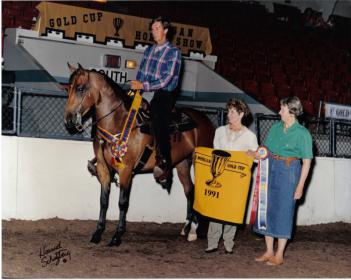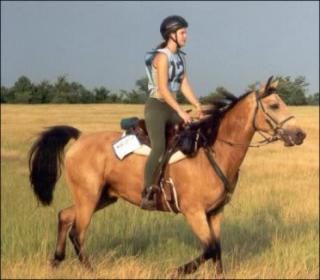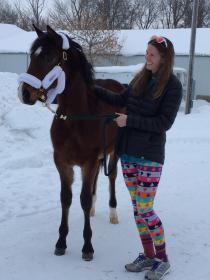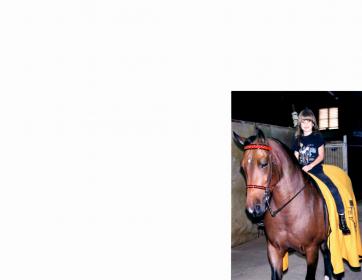Thankyou for the information! I was always told that 2 was too young and that the pressure on their joints could cause lasting damage as you explained a little bit above! I’ll definitely look more into it and speak with a few professionals at my barn. Im learning lots of new things already.
That asking and thinking about responses and then going to find out more is best way to make plans.
Pick your vet and trainer’s brains about any and all, is how all of us learn.
I bet you will have a really nice colt as he is growing along and you, as all of us do, keep learning more.
The thoroughbred racing industry is analyzing massive amounts of data, and it’s been shown that working horses hard at age 2 is beneficial in the long run. Their bodies develop stronger skeletons, tendons and ligaments when stressed during growth periods rather than waiting until they are mature. You build an athletic body through work, and there is a window of time for optimal results, which is when the horse is still young and growing. The skeleton Dr. Bramlage is referring to did not cut and paste, so I linked the article below. You’ll want to educate yourself on conditioning and progressive loading so you understand, in general, how hard you can work your horse and how much time the horse needs to recover. Many trainers/riders don’t bother to do that, which is why they end up with injuries and problems.
"Aren’t horses running on undeveloped bones and joints – not just as 2-year-olds, but all horses?
Dr. Larry Bramlage: Roughly, this is a schedule of the disappearance of the growth plates. Skeletons mature from the ground up, and just because the growth plates are still there does not indicate anything related to injury. The one that’s commonly followed is the growth plate at the distal end of the radius or what horsemen mean when they say ‘Are the knees closed?’ That was shown 30 years ago in a paper by Dr. Gabel at Ohio State that it had no relation to injury. That’s because the skeletal age, or the maturity of the bones, is not the thing that causes the horse problems – it’s adaptation to training.
Most people that have some passing interest in horses think you should wait until the horse is fully mature and has no growth plates in its limbs – that would be four or five years old. The growth plates in the withers, those are going to be there until they’re 12 or 13, if that gives you an indication of the fact the growth plates aren’t all that important as far as skeletal maturity. But the people who think you should wait until the growth plates are gone before you start training, that gets proven to be wrong over and over in scientific studies. The reason is that as the horse finishes growing, he’s got the blood supply and cell population that supports growth. What’s best for the horse is to start training during that period of time and convert those support processes from growth to adaptation to training. The cells that would disappear because the skeleton is fully grown just switch jobs and start modeling the bones for the stress of training.
This all goes back to understanding that racehorses are not born with racehorse skeletons, they make them. The training is most effective when you catch the horse at the time they’re most able to respond, which is roughly the time when they’re two years old."
https://www.paulickreport.com/news/ray-s-paddock/santa-anita-breakdowns-your-questions-answered/
This is all very interesting and it makes sense. I’ll be looking into this deeply. I really want him to become the best horse he can be in the safest ways for him. Plus he’s just gorgeous too. (I might be biased lol)
You would have fun and get good ideas if you follow the story of poster @clanter and his new colt Socrates.
He has posted several stories, still ongoing, on the Off Course forum.
Then you can tell us all about your colt and his stories as he grows up.
I am not so sure as there was one young horse that we bought that was to be our kid’s English Pleasure Horse. The mare had the heritage blood lines to be a top English Pleasure mount. Bought her as a long yearling … we had her in training at a farm back east…everything there was English…we let her abilities decide what she was to be rather than make her what we wanted… and she wanted to be a Western Horse … she was a very, very good old line Morgan Western Pleasure Horse
Shamrock Foxie Joy
[ATTACH=JSON]{“data-align”:“none”,“data-size”:“large”,“data-attachmentid”:10548441}[/ATTACH]
the current long yearling is also a Morgan, we knew somewhat of his blood lines and we had a purchased a horses from the breeder before so when she said he had the making for a trail horse we felt comfortable as the perilous horse we had from them daughter rode to a national championship in NATRC competitive trail
Prairie Hill Mulligan
[ATTACH=JSON]{“data-align”:“none”,“data-size”:“large”,“data-attachmentid”:10548442}[/ATTACH]
and the new one is Prairie Hill Socrates this photo was from when she picked him up back in March between blizzards in North Dakota
[ATTACH=JSON]{“data-align”:“none”,“data-size”:“large”,“data-attachmentid”:10548443}[/ATTACH]



How do you know what a horse wants to be? Is it just the training that takes easiest to them? Or movements that seem to come natural?
As with kids a parent has a desire for them to grow up to be such and such but for the happiness and well-being of the child they need to find their own path
I can not claim to have a magical gift of insight but having trained air traffic controllers I learned to watch for little signs.
We expose our horses to various activities much like one does with a child. Sure we have a Desired Outcome, but sometimes that outcome is different than what was desired. I just learned that from the Foxie horse as the last thing we were looking to get was a western horse. The reason we went back to Kentucky was to get an English horse as nearly everything in Fort Worth is western.
To say the least I was surprised to find her under western tack when I went back to check on her training progress. Our trainer, Rob Wilson, knew what he was doing …he told me she just did not have English in her, so western it was. After talking some I agreed to leave her with him until she stopped improving…which was really a good thing for the horse as she just kept getting better and better.The goal was for kid safe horse [ATTACH=JSON]{“alt”:“Click image for larger version Name: EPSON002.JPG Views: 4 Size: 8.8 KB ID: 10548724”,“data-align”:“none”,“data-attachmentid”:“10548724”,“data-size”:“full”}[/ATTACH]
Some horses like to do this or that while others enjoy whatever you present (we have Morgans who really can be successful in multiple disciplines…daughter’s buckskin in a three week period did an endurance ride placing well, the next weekend was at the Morgan Nationals capturing a reserve championship in working hunters over fences, then the following weekend was in the Davis Mountains at 7,000 feet doing a 55 mile competitive trail ride where he won his division and was second overall only by one heart beat to horse that came from Colorado that was kept in the mountains …our place is at only about 400 feet)
Just takes a lot of equipment as most of our horses had three saddles, they change their appearance with the tack. They will shorten of lengthen their gaits to correspond with the tack
Young stock is interesting as you really have no idea just what they may be most successful at, all one can do is expose them to the various disciplines…or you could get the shoe horn out to cram them into something they may not really enjoy but will do it because you asked them

You do realize Showmanship is usually ( and aways in QH and other stock horse breeds plus Arabs IIRC) judged on the handlers ability to turn out and properly present the horse? Review the rules of wherever you do show him.
Be careful you don’t ask too much or fuss too much when he’s too young. Some horses with tons of Halter class mileage mature on the nippy side. IME. The routine necessary to get them turned out and stood up to show standards can get to be a bit much. Listen to your colt and believe him if he tells you he’s had enough.
The horse’s athletic ability and way of going will tell you. Plenty of quality time spent with your youngster will really pay off when you go to start riding him. I would not hesitate to take him to some shows. That gives you a timeline for getting him ready - grooming, leading, setting up, trailer loading and shipping, tying up patiently. Being separated from other horses. Staying calm in a crowd. Working with him in small, quality increments will pay off in the long run. If he’s not ready when the show rolls around, stay home but put another one on the calendar. I’ve started over a thousand race horses and by far, the ones who learned the fastest and kept their cool were the ones that had gone through the auction ring, since they had months of prep and handling before being introduced to tack.
I will definitely be trying him out in as much as I can. Who knows, maybe I’ll notice that he takes to something more than reining! I went and saw him today settled in at his new stables and he’s gorgeous and so so so calm. I had every boarder stopping in wanting to meet me with questions about him saying he was the most relaxed colt they’d ever met. It’s also extremely easy to keep his attention. The entire time I was in his pasture he spent following me around and not even in a pushy “Give me attention” kind of way. Just in a slightly interested, patient, waiting for me to do something kind of manner. I’m very excited for his future. I think he’ll take to his training real easy.
If I can figure out how to use Horse Chronicles more, I’ll try to post updates on my profile or something if thats possible.
out of curiosity, how is he bred?
I’m sorry, I don’t think I understand the question. Are you referring to his pedigree and what qualities he was bred for?
That’s a good question, never be afraid to ask if you see terms you don’t understand. That’s how you learn.
”How is he bred” refers to what breed he is and who his parents and grandparents are. If a horse is registered, you can go back via the registry records for many generations but parents and grandparents are considered the most influential on the attitude and ability of a horse.
In most cases, you need to be a member of the registry organization to access that data but, in most cases, you need to join anyway to transfer ownership from previous owner to you and show at breed recognized events. There is a free site, allbreed pedigree, it has all TBs but it is incomplete on other breeds, IIRC depending on users to add that info. The really well known QHs and APHAs are on there and it can be helpful.
Back to your question, you give an answer like ( this is a made up pedigree) “ He’s AQHA registered, foaled in 2015. Sire is Hes A Nic by Reminic out of Chiclet by Chexmark Dunit . Further back he goes back to Doc Bar twice on top and through Sweet Chic O Lena to King on the bottom.” Again, I made this up as an example.
So…assuming you have the registration papers, how is your horse bred? “Reining bred” is way too general, what proven Reiners or cow horses are in his pedigree?
If you do not have the actual papers, what were you told? Best reason to be sure to get the papers is positive ID and proof of ancestry and ownership on third party records.
There are posters here who are members of various registries like AQHA and APHA (Paint) who can look up your horse if he is registered and you have the name he’s registered under spelled correctly and a brief description, foaling date helps too.
ETA if there are no papers, it’s not the end of the world. But details are a guess or “ believed to be”.
Is Socrates 100% Foundation?
I was able to take my yearling to do some trot a pole classes at a local schooling show this summer. These are typically ridden classes but since I’ve seen timid small children in these classes have a leader I figured it couldn’t hurt to ask ahead of time if my yearling could “compete” in hand just for the experience. The organizers were fine with it and it was a pretty entertaining experience for all as most of the folks who attend don’t get to spend too much time around young horses. So might be worth reaching out to your local schooling show organizers too.
I also took my yearling trail riding with me quite a bit this past summer and I think that went a long way in helping him feel comfortable in the trailer and in new places. I rode on of his pasture mates (all good trail mounts) so he had a confident leader to follow. Obviously not the same as a show but still a nice way to see more of the world.
Keep spending time with him and lots of groundwork, possibly send him out as a 2 year old to a Reiner to get started…you may find he goes a different direction than what you intend him to do.
When reining was first started, people reined on any old horse, they often took an all around horse, put some plates on, ran on some slick ground and pulled the sucker into the ground. This is why you’ll see a lot of not very fancy high headed kind of wild looking reiners.
now a days, everything has been bred for it and it is so specialized, it’s hard to train and show a horse that isn’t bred for the sport like your horse. Best of luck and congrats on your new horse!
Thankyou all for spending the time to answer my questions. It never struck me that reining might just not be for him and I know now to make sure to give him the opportunities of something else in case it isn’t. Again, he’s really just a project horse, as I lost my life long Quarter horse earlier this year. He was 36!!!
No matter what he gets into, he’s something for me to learn more with and love until I invest in a sport specific bred horse to thoroughly work with. Even then, I plan to keep him his entire life. 
Well, hope that happens for you but for now, he’s only 7 months old so don’t get too far ahead of yourself.
Also, I have a quick question. When I go to my profile, I can write in the activities section, does that just stay on my profile for people to see when they visit? SO I could post updates about him?
